Putin's mysterious Facebook 'superfans' on a mission
- Published
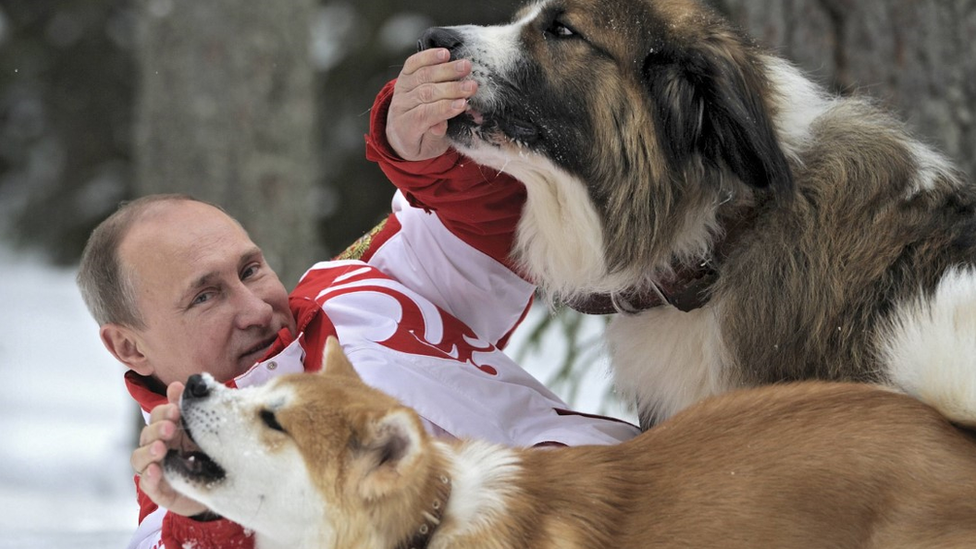
Putin's supporters like to share photos of the president playing with dogs in the snow
Russia's invasion of Ukraine has been widely condemned in many parts of the world, but a network of Facebook groups run by people with obscure motivations would like to change perceptions of the country's leader.
Millions of people have viewed posts committed to portraying President Vladimir Putin as smiling, benevolent and peace-loving.
These are Putin's superfans - and we've been tracking what they do and where they come from.
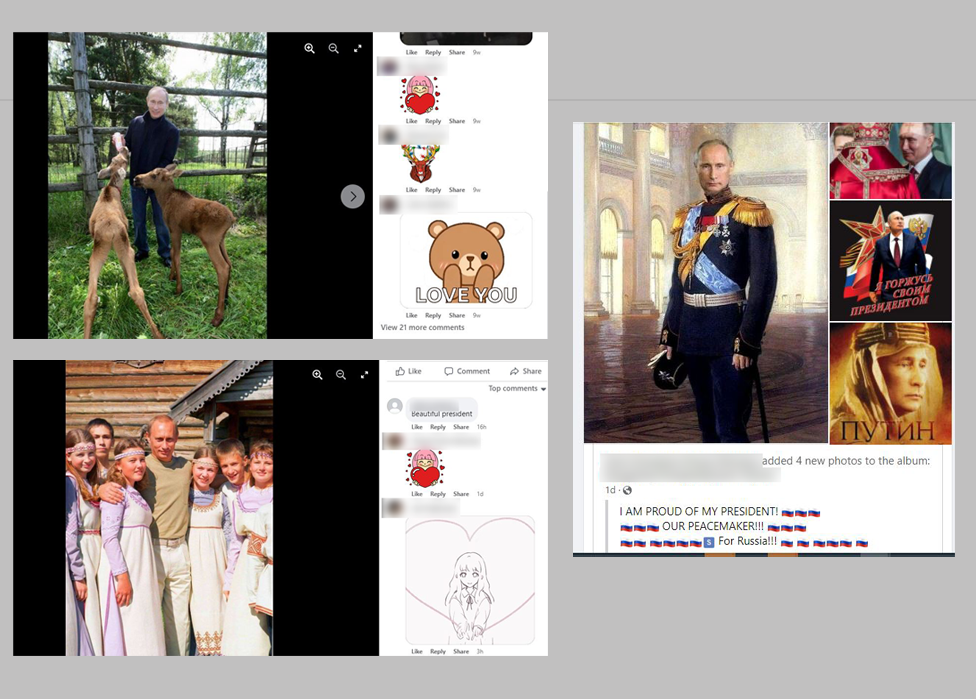
Thousands of posts praising the Russian leader have surfaced on a pro-Putin network of Facebook groups
Big numbers
The BBC has been investigating these huge pro-Putin groups with the help of researchers from the Institute for Strategic Dialogue (ISD).
ISD experts identified 10 pro-Putin public groups, boasting names such as Vladimir Putin - Leader of the Free World. The groups have more than 650,000 members between them. Content includes photos and messages praising the Russian leader, written in a number of languages, including English, Russian, Farsi, Arabic and Khmer.
Not only are they popular, but they are very active. Over the past month, researchers counted 16,500 posts, receiving more than 3.6 million interactions.
The overall aim of the groups seems to be to promote Mr Putin as a hero standing up to the West, with overwhelming international support.
The images often show the Russian leader "walking confidently, holding puppies, staring longingly into the camera, saluting troops, and riding an array of wild animals, including bears and lions".
These groups have gained more than 100,000 new members since the start of the invasion on 24 February.
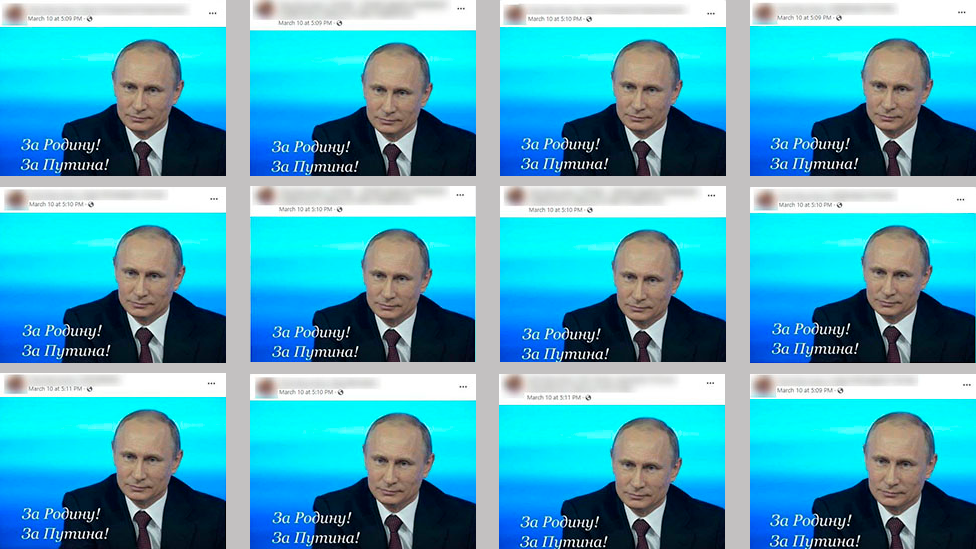
Many of the posts are put up repeatedly across groups by "superfan" administrators
Digging into the details of the people driving most of the content, it emerged that many of the fans listed as administrators of the groups have duplicate accounts under the same name. The researchers found at least 100 such accounts in the network.
These accounts generally follow each other and sometimes post heart-warming messages or send heart emojis to each other. And they administer these pro-Putin accounts alongside others pretending to be the Russian Federation or the Russian security services, which are clearly fake.
Running duplicate accounts is a potential violation of Facebook's rules on inauthentic behaviour, the ISD says.
Lead researcher Moustafa Ayad calls the practice an example of "astroturfing" - an online operation involving multiple accounts that falsely gives something the impression of wider grassroots support.
The campaign "creates the appearance of widespread support for Putin and the Kremlin in the shadow of the invasion and relies on... inauthentic accounts to accomplish its goal", according to the ISD report.
Active users
A closer examination of some of the group admins shows some unusual activity. One, named Marine, who says her location is Syria, uses three separate accounts to generate support for the president. Her three accounts, in Arabic, post at the same time every day.
Another moderator, Victoria, from Cambodia, has been pushing content in a Khmer language group. Since 4 February, her posts have generated more than 34,000 reactions and have been shared more than 4,000 times.
And Marine and Victoria jointly run a Khmer-language Facebook page, part of a wider pattern of co-ordination between some of the accounts.
Posts are widely shared across different groups. For instance, another account listed as located in Bulgaria posted the same Putin image 12 times in the space of a couple of minutes.
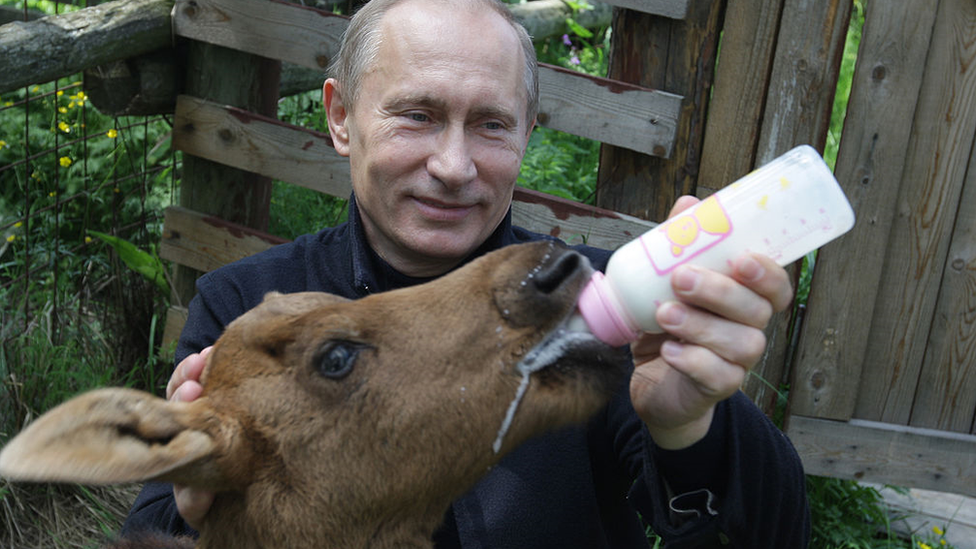
Vladimir Putin's appearances with animals are often shared by the network of fans
We tried to contact the people behind all of these accounts for comment, but didn't have much luck.
But a man in Kenya, called Raj, who's in several of these groups and includes "Putin" at the end of his name on Facebook, did answer the phone when we rang. In a brief conversation, he called the president a "great leader" but said he didn't want to discuss the war. We emailed him further questions about his interest in Russia, but he didn't respond.
Hasmik, from Armenia, says she's a journalist and now helps to run six pro-Putin groups. We asked who invited her to do it. She told us it was the people already running the groups and said that she wasn't paid for her efforts.
Russian links?
It's difficult to glean the motivations of the people behind the accounts. There is no obvious link to the Russian government and unlike other well-known Russian disinformation campaigns, the network isn't subtle; nor do the people involved hide their intentions.
But we can't rule out the possibility that the network has some links to the Russian authorities or pro-Putin elements inside Russia.
Many people around the world are drawn to Mr Putin and his anti-West view of the world.
We contacted Facebook, which says it has policies against fake accounts and has suspended a number of accounts based on information from the report and their own investigations.
"We're continuing to take strong action to prevent the spread of misinformation relating to the crisis in Ukraine," says a spokesman for parent company Meta.
Fake Putins
In the course of our research, we came across another interesting phenomenon - Vladimir Putin impersonation accounts.
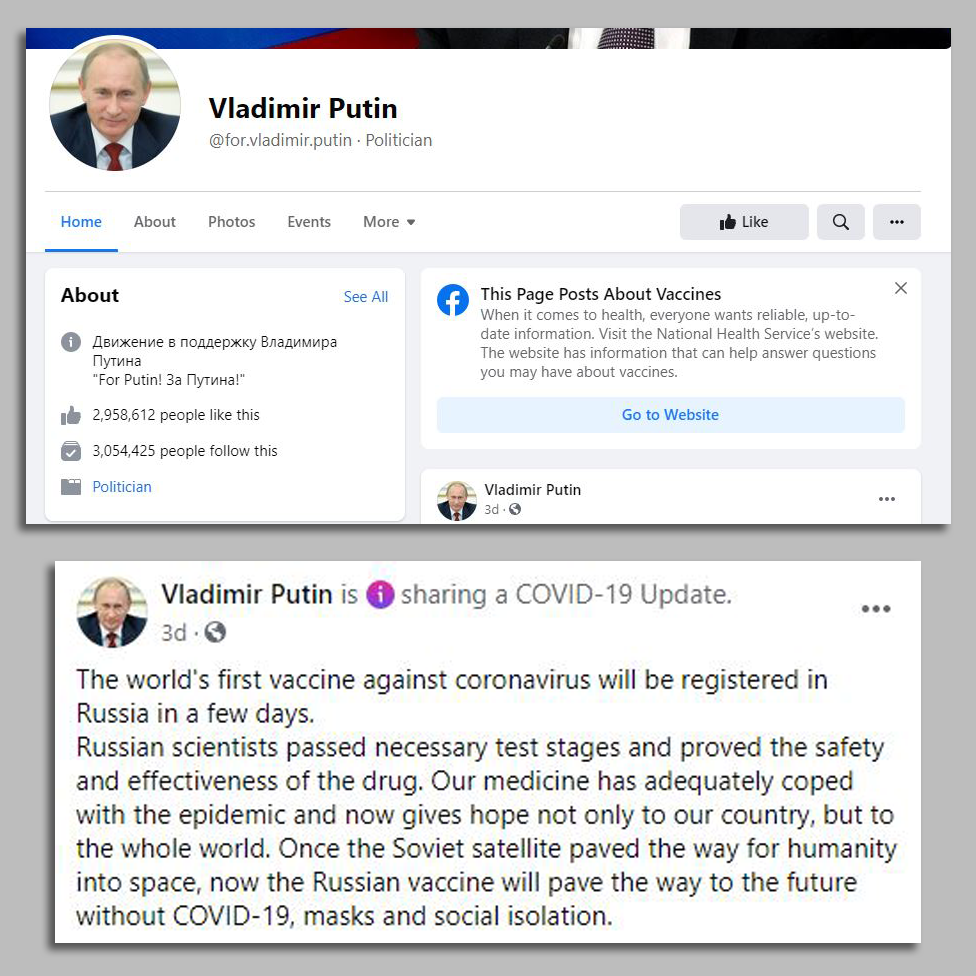
One of the Putin impersonation Facebook accounts had a massive following before being taken down
Mr Putin is one of the few world leaders who doesn't use social media, and there's no official Facebook account in his name. He reputedly doesn't even have a smartphone.
According to his spokesman, Mr Putin simply "does not need" social media as it "doesn't give him anything he doesn't have already".
But some have filled the gap left by his online absence. The page on Facebook displayed above had more than three million followers until it was taken down for impersonation shortly after the invasion at the end of February.
A significant number of its subscribers - more than 700,000 - joined during the pandemic, when the page was talking up Russian-made Covid vaccines.
More recently, the page was posting messages amplifying the Kremlin's view of the war, and many commenting on it appeared to believe it contained the genuine words of the Russian president.
Shortly after the invasion, a post on the page declared the goal of the "operation" was "peacekeeping... aimed only at the demilitarisation of a neighbouring country". This message was shared and liked more than 200,000 times.
And the page also had a habit of tagging people in its messages about Mr Putin, including users identified by researchers as having duplicate accounts. In other words, it was interacting with the Putin superfans.
We don't know who's behind this account. The people managing it are based in Russia and Latvia, according to the page's transparency section.
Fan pages are fertile ground to drum up support for the Kremlin internationally, says Nika Aleksejeva, a researcher at the Digital Forensic Research Lab (DFRLab), part of the Atlantic Council think tank.
"They may help to build public support in foreign countries for Russia's so-called 'military operation in Ukraine' unless taken down by mainstream social media platforms," she says.
DFRLab documented how one Putin-impersonator account, external posting in Arabic had paid for adverts targeting users in several countries, including Algeria, Libya, Egypt, Yemen, Morocco, Lebanon, and Tunisia. The page had more than one million followers, but has since been deleted.
Another prominent Putin page, posted in Arabic, used to be managed by a man who is also a big fan of Syrian leader Bashar al-Assad. It attracted almost a million followers before recently disappearing.